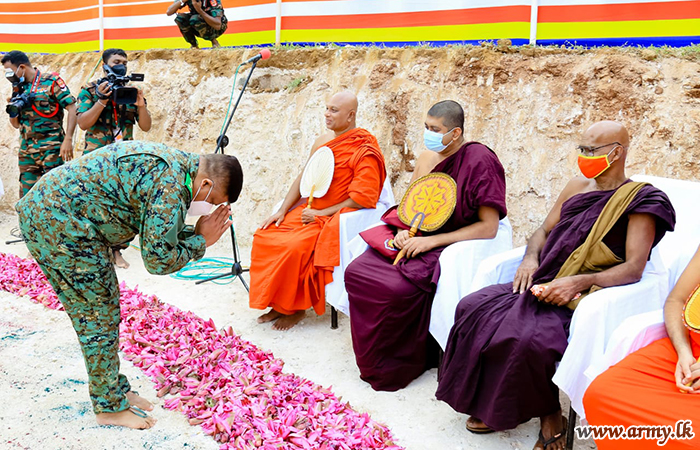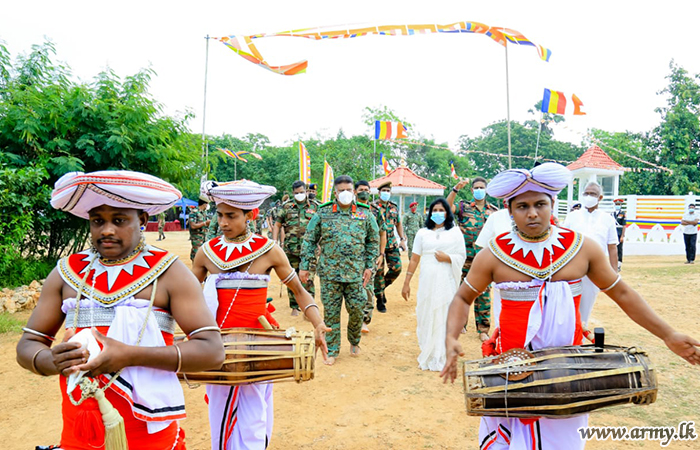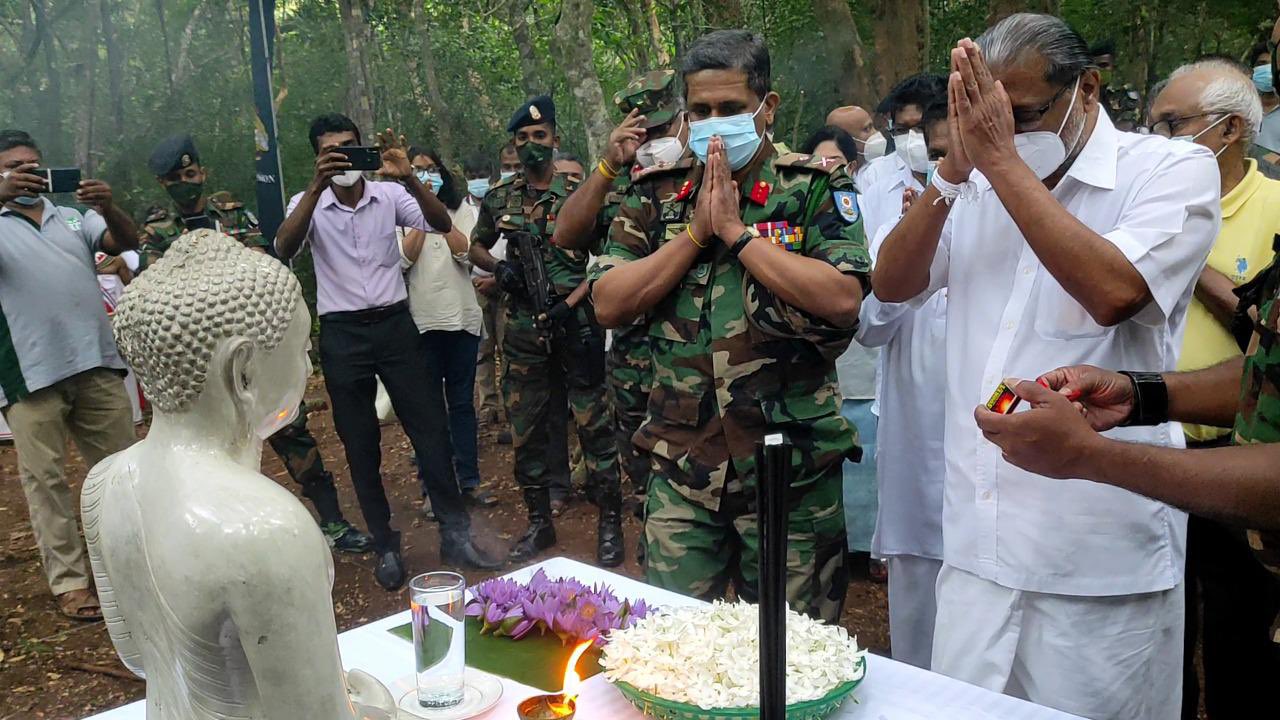Support for Sri Lanka’s Unity and Territorial Integrity is Tied to Tamils Aspirations for Equality, Justice, Peace and Dignity – India!
Veluppillai Thangavelu
The writing is on the wall for everyone to see. Only the blind and the deaf will fail to see or hear. Delivering his statement on OHCHR report on Sri Lanka, Ambassador Indra Mani Pandey, Permanent Representative of India, said they believe that addressing the rights of the Tamil community through meaningful devolution, contributes directly to the unity and integrity of Sri Lanka.

His full statement is as follows:
We have taken note of the High Commissioner’s report on Sri Lanka and her oral remarks. The Council has adopted 7 resolutions on the question of human rights in Sri Lanka since May 2009, when the three-decades-old conflict in that country ended.
India has been an active participant in the discussions on these Resolutions and has remained engaged with Sri Lanka as its close friend and immediate neighbor India’s consistent position rests on two pillars:
i). Support for Sri Lanka’s unity and territorial integrity.
ii). Abiding commitment to aspirations of the Tamils of Sri Lanka for equality, justice, peace and dignity.
These are not either-or choices. We believe that respecting the rights of the Tamil community, including through meaningful devolution, contributes directly to the unity and integrity of Sri Lanka.
Therefore, we advocate that delivering on the legitimate aspirations of the Tamil community is in the best interests of Sri Lanka. We call upon Sri Lanka to take necessary steps for addressing such aspirations, including through the process of reconciliation and full implementation of the 13th Amendment to the Constitution of Sri Lanka.
The assessment of the High Commissioner regarding developments nearly 12 years from the end of the conflict raises important concerns. The Sri Lankan Government has articulated its position on these issues as well. An evaluation of both of these, we should be guided by a commitment to find a lasting and effective solution for this issue.
Within the boundaries of diplomatic niceties and protocol, the Indian Ambassador Mani Pandey can only go this far, yet his message is clear.
In describing the position of India, the Ambassador said it stands on two pillars. Support for Sri Lanka’s unity and territorial integrity is conditioned by an abiding commitment to the aspirations of the Tamils of Sri Lanka for equality, justice, peace and dignity.
The option for Sri Lanka is not either-or choices. One pillar must exist in order for the other pillar to exist. If one pillar falls the whole structure falls! The structure cannot stand on one pillar alone.
The unity and territorial integrity of Sri Lanka depends on fulfilling the aspirations of the Tamil people for equality, justice, peace and dignity. This is not a statement that came from the blues, visiting Indian Prime Minister Narendra Modi and Foreign Minister Subramaniam Dr Jaishankar have repeatedly told the Sri Lankan rulers ad nauseam.
Unfortunately, both President Gotabaya Rajapaksa and Mahinda Rajapaksa have refused to listen. Both took refuge under subterfuges claiming “Sri Lanka is a sovereign and independent country. No outsiders can dictate terms or interfere with the internal affairs of Sri Lanka and by inference India as well!”.
Addressing a meeting in Chennai Prime Minister Narendra Modi on 21 February 2021 said that India has been consistently taking up the issue of the rights of Tamils living in Sri Lanka with the Sri Lankan government and gave an assurance that his administration is committed to ensuring that “they live with equality, justice, peace and dignity.”
Narendra Modi assured equality and justice for Tamils in Sri Lanka and said his government has always taken care of the welfare and aspirations of ‘Tamil brothers and sisters’ in Sri Lanka. He also claimed that he is the only Indian Prime Minister to have visited Jaffna, the capital of the Tamils-dominated Northern province.
“Through development works, we are ensuring the welfare of Sri Lanka’s Tamil community. The resources given by our government for Tamils have been much more than what it was in the past,” he said, listing the projects like 50,000 houses for displaced Tamils in North-Eastern Sri Lanka, 4,000 houses in the plantation areas, railway network to Jaffna and resumption of flight services from Chennai to Jaffna. (https://www.deccanherald.com/national/narendra-modi-assures-equality-and-justice-for-tamils-in-sri-lanka-951201.html)
On January 6, 2021, the Indian Foreign Minister Dr S. Jaishankar visited Sri Lanka during his first overseas visit to a foreign country during the current year. He held talks with President Gotabaya Rajapaksa, Prime Minister Mahinda Rajapaksa, Opposition Leader Sajith Premadasa, TNA leader R. Sampanthan, and many other politicians and dignitaries.
During a joint media interaction with Dinesh Gunawardena, External Affairs Minister, Dr S.Jaishankar underlined India’s backing for Sri Lanka’s reconciliation process and an “inclusive political outlook” that encourages ethnic harmony.
“As we promote peace and well being in the region India has been strongly committed to the unity, stability and territorial integrity of Sri Lanka and our support for the reconciliation process in Sri Lanka is long outstanding, as indeed for an all-inclusive political outlook that encourages ethnic harmony,” he said.
“It is in Sri Lanka’s interest’ that the expectations of the Tamil community for equality, justice, peace and dignity within a united country are fulfilled. That applies equally to the commitments made by Sri Lanka on meaningful devolution, including the 13th amendment to the constitution” Dr S. Jaishankar added.
The progress and prosperity of Sri Lanka will be advanced as a consequence he asserted.
His remarks came in the backdrop of sabre-rattling by some SLPP Ministers and their allies campaigning against the holding of Provincial elections. They want to abolish the Provincial Council system claiming the councils are white elephants.
They also want to abolish 13A imposed on the people by the Indo-Ceylon accord signed between President J.R. Jayewardene and the Indian Prime Minister Rajiv Gandhi in 1987. At the forefront of the campaign is ultra-nationalists like Sarath Weerasekara, Minister for Public Security, Wimal Weerawansa, Minister of Construction, Engineering Services, Housing, and Common Amenities and Udaya Gammanpila. Minister of Energy. This trio was also in the fore-front vehemently opposed to handing over 49 % interest in the Eastern Container Terminal (ECT) to India and Japan.
Initially, President Gotabaya Rajapaksa was in favour of honouring the repatriate MoU signed in May 2019 with India and Japan for a 51:49 per cent government majority. During talks with the Ports Trade Unions, he said Sri Lanka should honour the MoU since repatriate agreement involves geopolitical ramifications. He further asserted that “stopping the deal would endanger the 66% of Indian transhipment cargo handled by the ECT. Therefore, in order to remain competitive, the deal was needed.”
However, the politically biased 23 Ports Unions stood their ground. Like Shylock, they demanded their pound of flesh. Geopolitics was Greek to them. Then came the coup de grace delivered by none other than the Prime Minister Mahinda Rajapaksa himself. He announced in parliament that not one inch of ports city will be sold to foreigners. On 01 February his office in a statement said that the Sri Lankan government has decided to run the ECT as a fully-owned operation of the state-run port’s authority.
Obviously, the government succumbed to pressure from the trade unions, allies of the SLPP and some militant Buddhist monks who opposed the joint venture to develop the strategic cargo terminal. The SLPP, led by the Rajapaksa was also portraying itself as an ultra-nationalistic force opposed to bartering away national assets to foreign entities.
All India could do is to issue a press statement. It asked the Sri Lankan government to abide by the existing understandings and commitment of a trilateral agreement involving Sri Lanka and Japan to develop the strategic Colombo Ports Eastern Container Terminal (ECT).
“The commitment of the Government of Sri Lanka in this regard has been conveyed several times in the recent past, including at the leadership level. Sri Lanka’s Cabinet also took a decision three months ago to implement the project with foreign investors. All sides should continue to abide by the existing understandings and commitment,” the spokesman for the Indian High Commission Office in Colombo stated.
Strangely when large chunks of land in the Ports City, including 88 ha of freehold land was ceded over to China there was no hue and cry by the Sinhala – Buddhist nationalistic forces and the Colombo Ports Unions. There was stony silence, not even a whisper!
In lieu of investment of $1.4 million the Rajapaksa government vested both freehold and leasehold lands reclaimed as follows:
Land Reclamation and Allocation
The CA specifies that the area of reclaimed land will be at least 233 ha and that the PC shall bear the complete cost of reclamation, estimated at $1.4 billion. In return, the PC will have rights over at least 108 ha of so-called marketable land –20 ha on a freehold basis and 88 ha on a leasehold basis. Note – A ha = 2.471 acres.
SLPA/GOSL shall be entitled to at least 62 ha of marketable land and the remaining 63 ha will be allocated to common areas such as beaches, parks, roads and so on. If the reclaimed land were to be in excess or deficit of the stated amount, it would be shared among the two parties on 60:40 split favouring the PC.
Freehold land entitles the PC to outright ownership over the land; leasehold means that the project company will be awarded a 99-year master lease with a hold period of 35 years. The latter means that within 35 years after the granting of that lease, the PC may request GOSL to grant a fresh lease of 99 years to anybody, including itself, as it deems fit. After 35 years, it may only request a lease for 99 years minus the number of years elapsed since the 35thyear of the master lease. In effect, the PC has complete ownership over 20 ha and a 134-year lease on 88 ha (chrome- extension://gphandlahdpffmccakmbngmbjnjiiahp/https://fsi-live.s3.us-west-1.amazonaws.com/s3fs-public/colombo_port_city.pdf
It was left to the much-maligned Yahapalana government to renegotiate the deal and remove the clause contained in the 2014 agreement signed by the Rajapaksa government. The 88-ha freehold given on perpetuity to CCCC was converted to leasehold in 2016. Under the revised scheme China will be given 270 acres on a 99-year lease with no freehold rights. (https://www.scmp.com/week-asia/geopolitics/article/3009731/next-hambantota-welcome-chinese-funded-us14-billion-port-city)
Thus, it will be seen the pro-Chinese lobbyists like Wimal Weerawansa and Day Gammanpila shut their eyes, closed their ears and didn’t open their mouths when the country involved is China. On the contrary, they go berserk and fire cylinders when the government wants to give 49% of the ECT to India and Japan. Of course, these two are lightweight politicians leading fringe parties with no mass support but they seem to punch above their weight!
The SLPP government has now signed another agreement with China to install a hybrid renewable energy system in three islands Analaitheevu, Nainatheevu and Neduntheevu (Delft Island) off the coast of Jaffna peninsula at a cost of USD $12 million. The Neduntheevu island is only 48 km away from the Indian coastal town of Rameshwaram.
This despite the efforts by the State Minister Dulles Alahapperuma to get the installation done by India free of cost! Apparently, at the end of the day, the anti-Indian Ministers in the cabinet had their say.
In February 2021 the Sri Lankan government said it was in talks with the Chinese government to construct a new maximum-security prison. Also last year, Sri Lanka’s state-owned Bank of Ceylon entered into a long-term facility with the China Development Bank, the largest development financial organization in the world, for USD $140 million while Sri Lanka’s economic crisis worsened amidst piling debt repayments.
According to official data from August 2020, China owns approximately 10 % of Sri Lanka’s foreign debt. The burden of foreign debt is slowly sinking Sri Lanka into the India ocean thanks to Mahinda Rajapaksa’s utopian and fancy joint ventures.
Sri Lanka’s foreign debt repayment is USD 4 bn in 2021, USD 4.5 bn in 2022, USD 4.2 bn in 2023, USD 4.4 bn in 2024 and USD 5 bn in 2025! (Data from the Department of External Resources, Sri Lanka)
The Rajapaksa government instead of solving problems is bent on multiplying them at a geometric progression. Most of the problems are government made like the cremation of Muslim who died of the coronavirus epidemic. The government relented only because they needed the crucial votes of 4 Islamic countries at the UNHRC.
The Sri Lankan government has opened a second front against Hindu Tamil in the Northeast. The state has stepped up land grab under the guise of excavating Buddhist ruins. Last November 2020 the Archaeology Department, along with Buddhist monks seized the Vedi Arasan fortress in Neduntheevu. The Buddhist monks claimed that the said fortress belonged historically to a Tamil Buddhist King. The Archaeology department has issued a gazette acquiring an acre of land in Neduntheevu claiming that it contains a ruined Buddhist monastery complex. According to a report in the Sunday Times, the land was declared an “archaeological reserve” under the Antiquities Ordinance Act.

On February 21, Shavendra Silva attended a ceremony as chief guest to lay the cornerstone for the construction of a 100 ft high Buddhist Stupa in Thaiyiddy, Jaffna where there are no Buddhists! The land for the erection of the Stupa is a private property owned by a Tamil but occupied by the army!

The ceremony was attended by all departments of the military and members of the Buddhist clergy. Silva was invited as the chief guest by the Commander of the Jaffna security forces, General Priyantha Perera. Kandyan drummers led the accused war criminal to the site where he laid the foundation stone.

In the East 2,000 Buddhist sites of importance have been identified by Archeological Chakravarthy Ellawala Medhananda Thero. Thousands of acres of lands have been identified in villages like Thiriyai, Pulmoddai, Kutchchavel in the East and places of Hindu worship in Kurunthur, Vedukkunarimalai, Neeraveli Cemmalai Pillaiyar temple in the North. Several cases against the Archeological Department are pending before courts.
Predictably the Tamils of the northeast are not taking this Sinhala – Buddhist hegemony lying down. The P2P long march showed that the Tamils cannot be kept under the gun easily. Not a single day passes in the Northeast without people staging hunger strikes, roadside protest marches and rallies against the government.
The US State Department’s International Religious Freedom Report for 2016 said that the construction of such sites and Buddhist statues in non-Buddhist areas in the North-East, despite objections from locals and leaving civil society with the perception of “Buddhist Sinhalese religious and cultural imperialism”.
Coming on the heels of the Sri Lankan government reneging on the 2019 Colombo Port Memorandum of Agreement, Sri Lanka cleared a Chinese energy project in three islands off the Jaffna peninsula that are barely 50 km from the Tamil Nadu coast.
On January 18, the Cabinet approved a proposal to involve Sinosoar-Etechw in Joint Venture in China to install ‘hybrid renewable energy systems’ in Nainatheevu, Neduntheevu, and Analaitheevu located in the Palk Bay.
The three islands concerned are quite close to Tamil Nadu, India. Analaitheevu is just 29 km from the TN coast. The other two Nainatheevu and Neduntheevu are also close to the TN coast. Justifiably, the security interests of India on its southern flank will be compromised if this scheme goes ahead.
India has not commented on the proposed installation, but sources in Colombo said: “security concerns were raised” citing the project site’s proximity to the Indian coastline
True to form, the loose, loud-mouthed and brash Minister Wimal Weerawansa has proclaimed that under no circumstances will the hybrid renewable energy system for the 3 islands will be given to India. This is when India has not officially evinced interest in the hybrid renewable energy project. Then why on earth Minister Vimal Weerawansa is jumping in his seat when other SLPP Ministers have not uttered a word in public? The question arises whether SLPP is unable to put the genie back into the bottle?
In this gloomy background, it is hilarious for some SLPP Ministers to plead with India to support Sri Lanka at the UNHRC 46th sessions. The vote on the resolution moved by the core group of countries is scheduled for March 22nd of this month.
In the final analysis, support for Sri Lanka’s unity and territorial integrity is not separable from the aspirations of the Tamils of Sri Lanka for equality, justice, peace and dignity, it is both!

Leave a Reply
You must be logged in to post a comment.